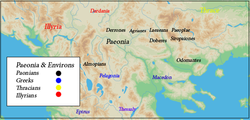
Laeaeans
Encyclopedia

Agrianes
The Agrianians a Paeonian-Thracian tribe, who chiefly inhabited the area of present-day Northeastern statistical region of Republic Of Macedonia and Pčinja District of southern Serbia, north of the Thracian Maedi tribe, who were situated in what is now the Greek region of Macedonia and Western...
, another Paeonian tribe, along the upper course of the Strymon river, at the western edge of Thrace
Thrace
Thrace is a historical and geographic area in southeast Europe. As a geographical concept, Thrace designates a region bounded by the Balkan Mountains on the north, Rhodope Mountains and the Aegean Sea on the south, and by the Black Sea and the Sea of Marmara on the east...
. They were not incorporated into the Odrysian state or the Paeonian state, remaining an independent tribe outside the borders of those kingdoms. According to Thucydides
Thucydides
Thucydides was a Greek historian and author from Alimos. His History of the Peloponnesian War recounts the 5th century BC war between Sparta and Athens to the year 411 BC...
, the Laeaeans, along with the Agrianes, the Thracian Dii
Dii
The Dii were an independent Thracian tribe, swordsmen, who lived among the foothills of Mount Rhodope in Thrace. They often joined the ranks of organized armies as mercenaries or volunteers...
, and other tribes, joined Sitalkes
Sitalkes
Sitalces was one of the great kings of the Thracian Odrysian state. He was the son of Teres I, and on the sudden death of his father in 431 BC succeeded to the throne...
in his unsuccessful campaign against Perdiccas II of Macedon
Perdiccas II of Macedon
Perdiccas II was a king of Macedonia from about 454 BC to about 413 BC. He was the son of Alexander I and had two brothers.-Background:After the death of Alexander in 452, Macedon began to fall apart. Macedonian tribes became almost completely autonomous, and were only loosely allied to the king...
. The coins
COinS
ContextObjects in Spans, commonly abbreviated COinS, is a method to embed bibliographic metadata in the HTML code of web pages. This allows bibliographic software to publish machine-readable bibliographic items and client reference management software to retrieve bibliographic metadata. The...
issued by the Laeaeans are judged to be of crude workmanship, and seem to be imitations of finer minted coins issued by other neighboring Paeonian tribes such as the Derrones. A typical coin bears the inscription LAIAI (Laeaeans) on the obverse, and a Pegasus
Pegasus
Pegasus is one of the best known fantastical as well as mythological creatures in Greek mythology. He is a winged divine horse, usually white in color. He was sired by Poseidon, in his role as horse-god, and foaled by the Gorgon Medusa. He was the brother of Chrysaor, born at a single birthing...
in a double linear square on the reverse. It is unclear whether or not the Laeaeans were conquered by Philip II
Philip II of Macedon
Philip II of Macedon "friend" + ἵππος "horse" — transliterated ; 382 – 336 BC), was a king of Macedon from 359 BC until his assassination in 336 BC. He was the father of Alexander the Great and Philip III.-Biography:...
or Alexander III of Macedon, although their neighbours are recorded by historians such as Arrian
Arrian
Lucius Flavius Arrianus 'Xenophon , known in English as Arrian , and Arrian of Nicomedia, was a Roman historian, public servant, a military commander and a philosopher of the 2nd-century Roman period...
as client kings.

